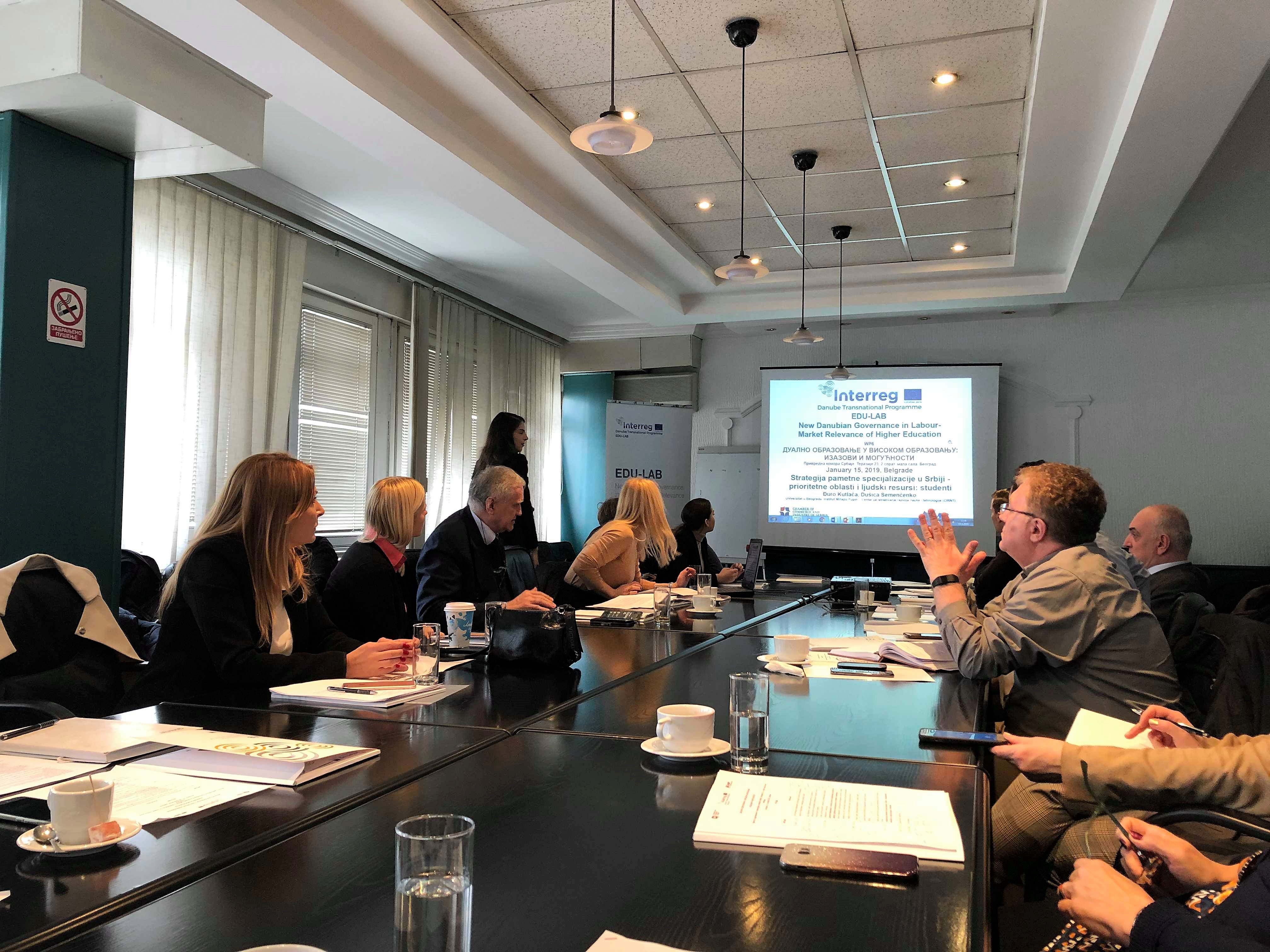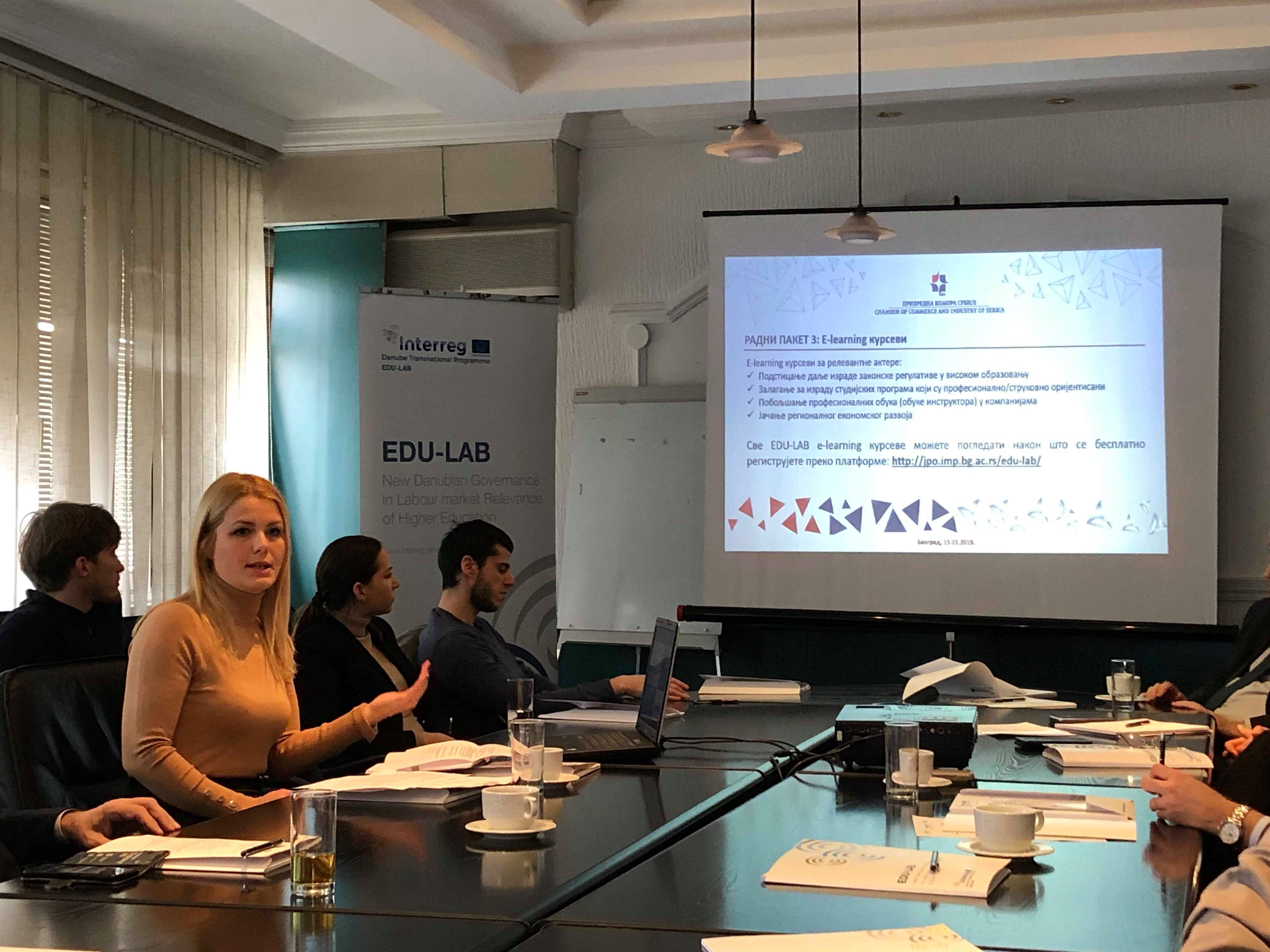EDU-LAB - EDU-LAB conference in Belgrade, Serbia
17-01-2019
The Institute Mihajlo Pupin (University of Belgrade) and the Serbian Chamber of Commerce and Industry organised a conference entitled “Dual Education in Higher Education - Challenges and Possibilities“on January 15th 2019 in Belgrade, Serbia. The aims of the conference were:
- presenting EDU-LAB and results of the pilot activities implemented in Serbia,
- exchanging of opinions and best practices among higher education institutions, business organisations/companies, and national public organisations,
- involving more stakeholders in the activities related to increasing the labour market relevance of higher education,
- collecting ideas for amending higher education acts in Serbia,
- establishing a coordination point in Serbia.
 The conference was attended by participants from higher education and research institutions (University of Belgrade, Faculty of Agriculture, Faculty of Mechanical engineering, FEFA- Faculty of Economics, Finance and Administration, Metropolitan University, Institute Mihajlo Pupin), national public authorities (Ministry of Education, Science and Technological Development) and the business sector (Serbian Association of Employers, clusters, “Gorenje Beograd”, Merkator doo, Elektromreza Srbije, Chamber of Commerce and Industry).
The conference was attended by participants from higher education and research institutions (University of Belgrade, Faculty of Agriculture, Faculty of Mechanical engineering, FEFA- Faculty of Economics, Finance and Administration, Metropolitan University, Institute Mihajlo Pupin), national public authorities (Ministry of Education, Science and Technological Development) and the business sector (Serbian Association of Employers, clusters, “Gorenje Beograd”, Merkator doo, Elektromreza Srbije, Chamber of Commerce and Industry).
Participants were welcomed by Ms Mirjana Kovačević (Head of the Center for Education and Dual Education, Serbian Chamber of Commerce and Industry) and Dr Gabrijela Grujić (Assistant Minister for Dual and Entrepreneurial Education, Ministry of Education, Science and Technological Development). This was followed by a speech by Prof. Nenad Zrnić (Vice-Rector for International Cooperation, University of Belgrade). He emphasised the win-win aspect of dual study programmes for students, companies and higher education institutions. Ms Ivana Kovačević (Senior Advisor for Education Development at the Serbian Chamber of Commerce and Industry) presented the results of the EDU-LAB pilot activities in Serbia which included a cooperation between Gorenje Serbia and the FEFA Faculty. Prof. Dr. Đuro Kutlača from Institute Mihajlo Pupin highlighted the importance of dual higher education for the implementation of a smart specialization strategy in Serbia.
 Every year around 30.000 people leave Serbia, with no intention to ever come back to start their career in their home country. The companies underlined that the lack of skilled workforce is one of the major challenges they had been facing for many years. Mr Goran Sorak (Head of Marketing, Gorenje Serbia) explained that one of the company`s main issues in Serbia is a lack of staff with higher education in their plants outside of Belgrade. They have different types of cooperation with several higher education institutions as there is a need for training the potential mentors of the company. This problem was echoed by Ms Sladjana Milojevic, Manager of Fashion Apparel Cluster Serbia. She added that the fashion industry faces a lack of experts who would train future textile designers in their practical work combined with a lack of willingness of young, educated designers to work in SMEs located in smaller Serbian cities. A representative of Elektromreza Srbije, a large national company also mentioned the lack of highly educated staff in his sector, with energy engineers rather looking for employment abroad than in the country. Therefore, in order to attract young talents, they established a cooperation with two faculties of the University of Belgrade.
Every year around 30.000 people leave Serbia, with no intention to ever come back to start their career in their home country. The companies underlined that the lack of skilled workforce is one of the major challenges they had been facing for many years. Mr Goran Sorak (Head of Marketing, Gorenje Serbia) explained that one of the company`s main issues in Serbia is a lack of staff with higher education in their plants outside of Belgrade. They have different types of cooperation with several higher education institutions as there is a need for training the potential mentors of the company. This problem was echoed by Ms Sladjana Milojevic, Manager of Fashion Apparel Cluster Serbia. She added that the fashion industry faces a lack of experts who would train future textile designers in their practical work combined with a lack of willingness of young, educated designers to work in SMEs located in smaller Serbian cities. A representative of Elektromreza Srbije, a large national company also mentioned the lack of highly educated staff in his sector, with energy engineers rather looking for employment abroad than in the country. Therefore, in order to attract young talents, they established a cooperation with two faculties of the University of Belgrade.
 At the same time, students complain of insufficient practical training at the companies during their studies, preventing them from gaining relevant experience and skills for future employment. Participants concluded that the problem lies in the system of formal education: students do not acquire enough skills and knowledge relevant to the labour market and practical training of students is not adequately regulated by the existing legal framework.
At the same time, students complain of insufficient practical training at the companies during their studies, preventing them from gaining relevant experience and skills for future employment. Participants concluded that the problem lies in the system of formal education: students do not acquire enough skills and knowledge relevant to the labour market and practical training of students is not adequately regulated by the existing legal framework.
More professionally oriented or dual study programmes could be one of the solutions for aligning the needs of the companies with the offers of the study programmes. The Ministry of Education presented the activities regarding the drafting of a new law on dual education in higher education. The law is expected to be adopted by the National Parliament by the end of 2019 and the results of EDU-LAB as well as recommendations prepared within the project should be taken into consideration and incorporated where possible.
